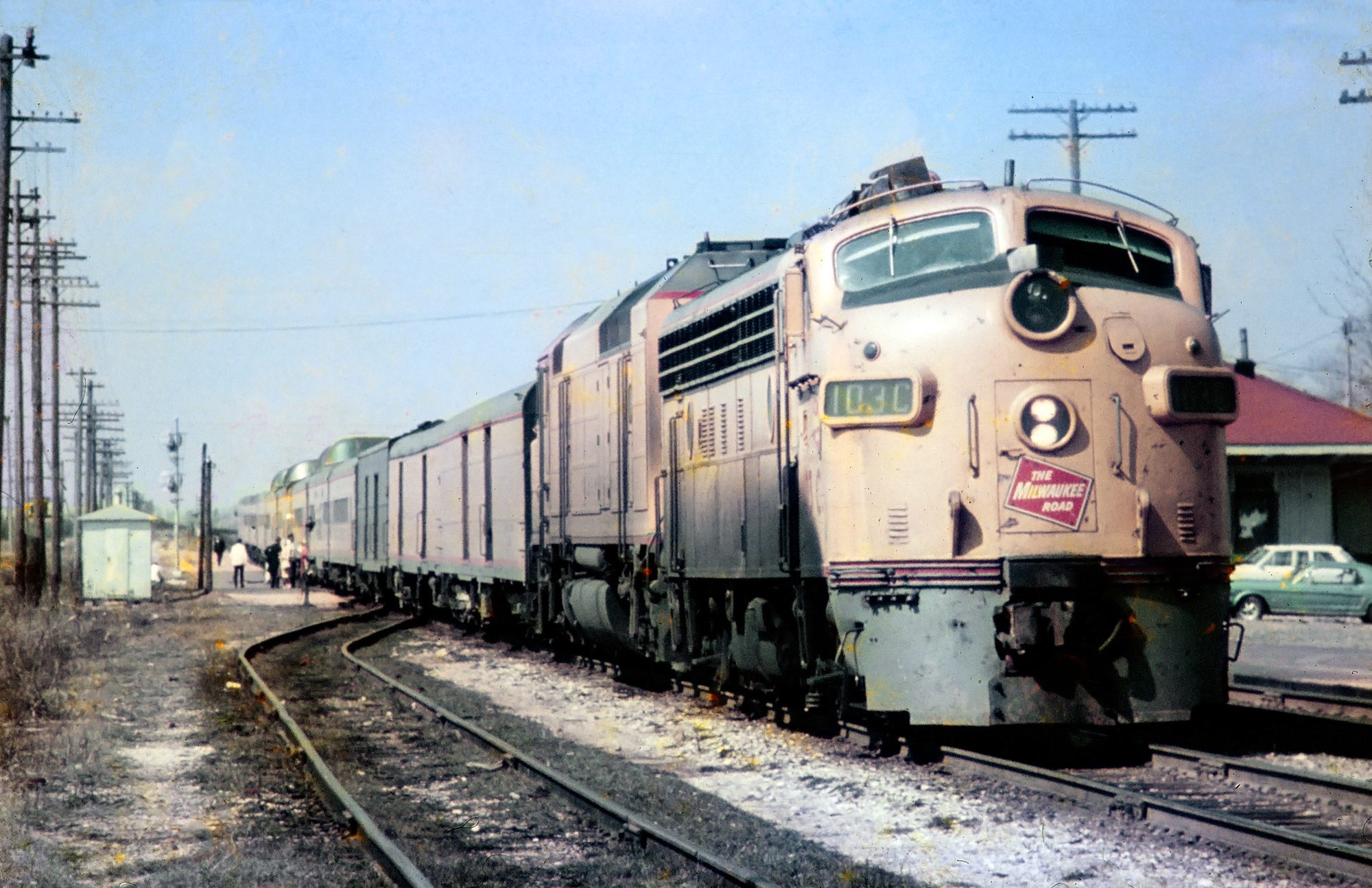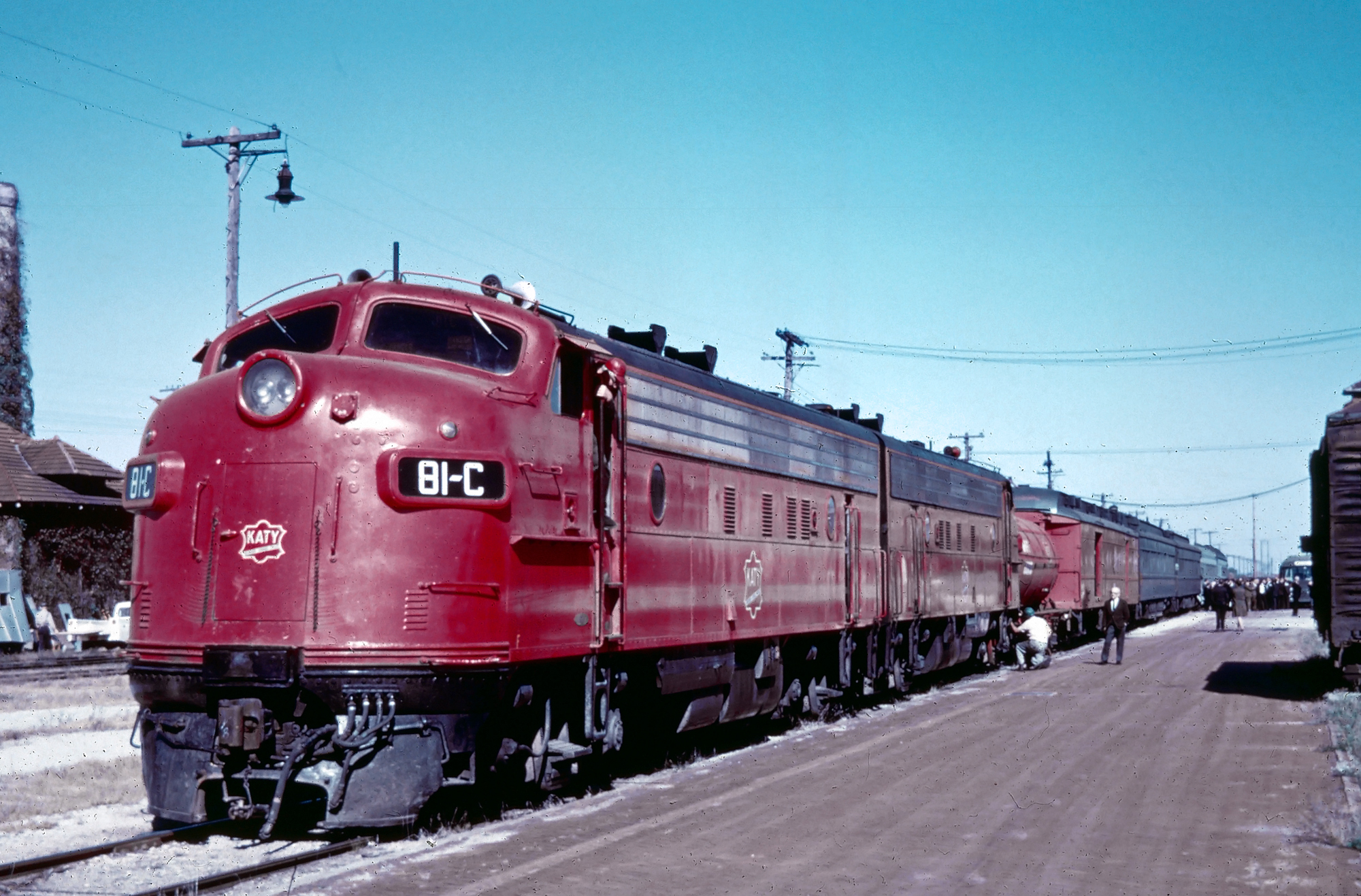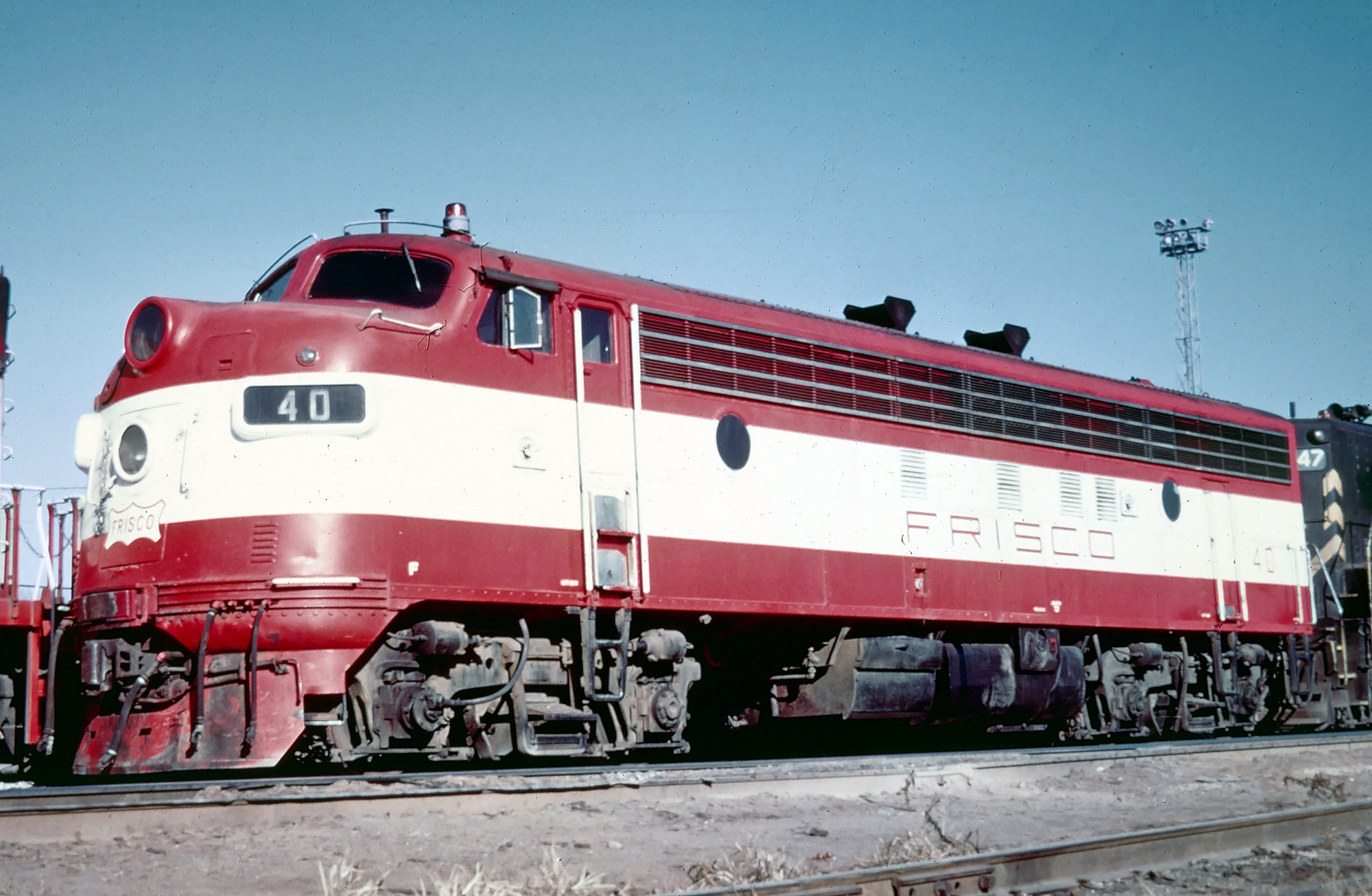EMD "FP7" Locomotives: Specs, Roster, History
Last revised: December 18, 2024
By: Adam Burns
The incredible success of Electro-Motive's F7, and earlier F3, led the builder to catalog a variant sporting a larger steam generator for passenger service, the FP7. Internally and visually, the locomotive was nearly identical to its counterpart save for its increased length.
Interestingly, despite already offering a standalone passenger series, some railroads found the B-B trucked F units more to their liking in passenger service as the locomotives offered better tractive effort in mountainous territory. The E models' A1A-A1A trucks, with an unpowered center axle, had trouble on stiff grades.
Surprisingly, for a variant, the FP7 sold quite well with nearly 400 examples manufactured (including those constructed by subsidiary General Motors Diesel for Canadian lines). Today, numerous FP7s remain preserved and in operation around the country.
Notable units include a pair of demonstrator units (#7001 and #9051), Clinchfield #200 at the West Virginia Central, Southern Railway #6133 at the North Carolina Transportation Museum, and Southern Railway #6141 and #6138 which pull RJ Corman's My Old Kentucky Dinner Train.
Photos
 Milwaukee Road FP7 #103-C has one of Union Pacific's "City" streamliners at Davis Junction, Illinois in April, 1969. American-Rails.com collection.
Milwaukee Road FP7 #103-C has one of Union Pacific's "City" streamliners at Davis Junction, Illinois in April, 1969. American-Rails.com collection.Overview
The FP7 entered production in June, 1949 when Rock Island #402 rolled out of EMD's McCook plant that month. As the builder ramped up production of its "E" series catalog, some roads, like the previously-mentioned AT&SF and SP, realized the locomotives' A1A-A1A trucks provided relatively poor traction in mountainous environments.
In his book, "Southern Pacific Historic Diesels, Vol. 3," author Joseph A. Strapac notes the Southern Pacific considered the E7, for example, "...a frail device, better suited to the water-level New York Central than the harsh operating environment of the far West. Far too often, SP's combination of heavy trains and rugged profiles forced dispatchers to assign helpers to E7 consists."
To remedy this, SP took the somewhat unique approach of purchasing a large fleet of PAs, especially the later PA-2, which sported the more rugged and robust GE-built 752 traction motors. The Santa Fe took a somewhat different approach, deciding to equip its top trains with the sure-footed F3 and F7.
With their B-B trucks, the Fs placed their full weight on the rails. As a result, the FP7 could offer tractive efforts between 29,500 to 40,000 lbs (depending on gear settings) while the best an E7 could provide was 27,000 lbs at the lowest gear setting.
EMD already cataloged the F2, F3, F7, and later F9 with optional steam generators. However, the engine compartment did not have sufficient room for both the generator and needed water supply. To get around this, Louis A. Marre notes in his book, "Diesel Locomotives: The First 50 Years," EMD placed water tanks under the frames of these models. In addition, the steam generator exhaust stack was located at the rear of the locomotive's roof.
In the Santa Fe's case, it attempted to provide amble water supply by placing a generator in the F3's "A" unit and the water tank in the accompanying B unit. Such a maneuver did work but always required at least two units in every train consist, thus increasing operating costs.
The FP7 solved all of these issues. In his book, "Electro-Motive: E-Units and F-Units," author Brian Solomon notes the model provided a 970-gallon water tank for the steam generator with a total water capacity of 1,750 gallons, nearly twice as much as a comparable F3.
This allowed the locomotive to operate much longer between necessary water stops. It also carried an added benefit of doubling in freight assignments; such redundancy was always cherished by railroads.
 Katy FP7 #81-C is seen here stopped at Parsons, Kansas with the company business train on October 4, 1968. Mac Owen photo. American-Rails.com collection.
Katy FP7 #81-C is seen here stopped at Parsons, Kansas with the company business train on October 4, 1968. Mac Owen photo. American-Rails.com collection.To house the steam generator and water tank inside the cab, the FP7 was 54' 8" in length, four feet longer than a typical F7. In his book, "Diesel Locomotive Cyclopedia - Volume 2," author Bob Hayden notes the stretched out carbody can be seen between the first porthole (nearest the cab) and first set of louvers.
Aside from its steam generator components, the FP7 was nearly identical to the F7. It featured EMD's 16-cylinder, model 567B prime mover - that could produce 1,500 horsepower - and carried the company's D27C traction motors, which offered as much as 40,000 pounds of continuous tractive effort.
It did, however, use a slightly upgraded main generator, the model D12D. Since the FP7 already housed all of the components needed for passenger service, there was little need to offer a cabless "B" variant.
In comparison to the FT, F3, and F7's success, the FP7's sales numbers appear low; only 379 were produced by the time production ended on the model in late 1953.
However, as a variant, it solved a specific and very important need for railroads either after greater tractive effort in passenger assignments or wanting a dual-service locomotive.
Data Sheet and Specifications
| Entered Production | 6/1949 (Rock Island #402) |
| Years Produced | 6/1949 - 12/1953 |
| Engine | 567B |
| Engine Builder | GM |
| Horsepower | 1500 |
| RPM | 800 |
| Cylinders | 16 |
| Length | 54' 8" |
| Height (Top Of Rail To Top Of Cab Horn) | 15' 0" |
| Width | 10' 8" |
| Weight | 258,000 Lbs |
| Fuel Capacity | 1,200 Gallons |
| Air Compressor | Gardner-Denver |
| Air Compressor Model | WBO |
| Air Brake Manufacturer | Westinghouse |
| Air Brake Schedule | 24RL |
| Trucks | B-B |
| Truck Type | Blomberg |
| Truck Wheelbase | 9' |
| Wheel Size | 40" |
| Traction Motors | D27C (4), GM |
| Primary Generator | D12D, GM |
| Auxiliary Generator | Delco (A8102) |
| Alternator | D14 |
| MU (Multiple-Unit) | Yes |
| Dynamic Brakes | Yes |
| Gear Ratio | 62:15, 61:16, 60:17, 59:18, 58:19 |
| Tractive Effort (Continuous, at 9.3 mph) | 40,000 lbs; 37,000 lbs; 34,000 lbs; 32,000 lbs; 29,500 lbs |
| Top Speed | 65 mph, 71 mph, 77 mph, 83 mph, 89 mph |
* Despite intended use in general passenger service, steam generators were still optional in the FP7. They were produced by Vapor Clarkson; model OK4625 (2,000 Lbs/Hr).
Production Roster
Total Built = 299
| Owner | Road Number(s) | Serial Number(s) | Order Number | Date Built |
|---|---|---|---|---|
| Chicago & Eastern Illinois | 1600-1609 | 7535-7544 | E1076 | 08-09/49 |
| Georgia Railroad | 1002 | 7605 | E1091 | 11/1949 |
| Western Railway of Alabama | 502-503 | 8018-8019 | E1131 | 11/1949 |
| Atlanta & West Point | 551-552 | 8020-8021 | E1176 | 8/1949 |
| Georgia Railroad | 1003 | 8322 | E1091 | 11/1949 |
| Rock Island | 402-411 | 8623-8632 | E1199 | 6/1949-7/1949 |
| Georgia Railroad | 1004 | 8870 | 3003 | 2/1950 |
| Western Pacific | 804A, 804C-805A, 805C | 9002-9005 | 6043 | 1/1950 |
| Milwaukee Road | 90A, 90C-95A, 90C | 10323-10334 | 3050 | 6/1950-7/1950 |
| Milwaukee Road | 96A, 96C-97A, 97C | 10361-10364 | 3073 | 1/1951 |
| Soo Line (Minneapolis, St Paul & Sault Ste Marie) | 501A | 10897 | 6134 | 1/1950 |
| Electro-Motive (Demonstrator) | 7001 (became Soo Line/Wisconsin Central #2500A) | 11012 | 6061 (sold on 6136) | 11/1949 |
| Electro-Motive (Demonstrator) | 9051 (became Soo Line #500A) | 11015 | 6062 (sold on 6136) | 11/1949 |
| Reading | 900-905 | 11387-11392 | 6091 | 5/1950-6/1950 |
| Southern (Cincinnati, New Orleans & Texas Pacific) | 6130-6139 | 11507-11516 | 6113 | 4/1950-5/1950 |
| St. Louis Southwestern Railway (Cotton Belt) | 330 | 11628 | 3056 | 4/1950 |
| St. Louis-San Francisco Railway (Frisco) | 5040-5045 | 11637-11642 | 6127 | 12/1950 |
| Soo Line (Wisconsin Central) | 2501A | 12211 | 6137 | 6/1950 |
| Southern (Cincinnati, New Orleans & Texas Pacific) | 6140-6149 | 12336-12345 | 6144 | 10/1950-12/1950 |
| Pennsylvania | 9832A-9866A | 12410-12444 | 3066 | 4/1952-8/1952 |
| Richmond, Fredericksburg & Potomac | 1201-1203 | 12908-12910 | 6171 | 11/1950 |
| Atlantic Coast Line | 850-859 | 13051-13060 | 6179 | 4/1951 |
| Louisville & Nashville | 663-668 | 13430-13435 | 3075 | 12/1951-1/1952 |
| Chicago Great Western | 116A, 116C | 13559-13560 | 6222 | 12/1950 |
| Atlanta & West Point | 553-554 | 13569-13570 | 6202 | 2/1951 |
| Louisville & Nashville | 600-621 | 13834-13855 | 6216 | 1/1951-3/1951 |
| Atlantic Coast Line | 860-869 | 13971-13980 | 6179 | 4/1951-5/1951 |
| Soo Line | 502A-503A | 13997-13998 | 3080 | 3/1951 |
| St Louis-San Francisco Railway (Frisco) | 5046-5051 | 14087-14092 | 6235 | 2/1951 |
| Louisville & Nashville | 622-634 | 14465-14477 | 6271 | 6/1951-8/1951 |
| Louisville & Nashville | 669-672 | 14588-14591 | 3075 | 1/1952 |
| Clinchfield | 200 | 14804 | 6310 | 2/1952 |
| Missouri-Kansas-Texas (Katy) | 121A, 121C-124A, 124C | 14805-14812 | 6318 | 1/1952-2/1952 |
| Atlantic Coast Line | 870-889 | 14839-14858 | 3083 | 8/1951-10/1951 |
| Milwaukee Road | 98A, 98C-103A, 103C | 15227-15238 | 3111 | 10/1951-12/1951 |
| Florida East Coast | 571-575 | 15568-15572 | 3088 | 12/1951 |
| Pennsylvania | 9867A-9871A | 15643-15647 | 3066 | 8/1952 |
| Northern Pacific | 6600-6601 | 15681-15682 | 3135 | 2/1952 |
| Chesapeake & Ohio | 8000-8013 | 16050-16063 | 3096 | 2/1952-4/1952 |
| Soo Line | 504-505 | 16472-16473 | 3136 | 9/1952 |
| Reading | 906-907 | 16681-16682 | 3150 | 9/1952 |
| Milwaukee Road | 104A, 104C-105A, 105C | 16944-16947 | 3130 | 9/1952 |
| Union Pacific | 911-912 | 17231-17232 | 6444 | 4/1952 |
| Atlantic Coast Line | 890-893 | 17256-17259 | 6445 | 8/1952-9/1952 |
| Chesapeake & Ohio | 8014-8015 | 17490-17491 | 3163 | 12/1952 |
| Southern Pacific | 6446-6461 | 18130-18145 | 3160 | 2/1953-3/1953 |
| Alaska Railroad | 1510-1514 (Evens) | 19064-19066 | 3169 | 12/1953 |
Rebuilds
Total Built = 2
| Owner | Road Number | Serial Number | Order Number | Completion Date | Heritage |
|---|---|---|---|---|---|
| Chicago Great Western | 116C | 13560 | 8000 | 10/1951 | Original #116C built in 12/1950 |
| Chicago & Eastern Illinois | 1609 | 7544 | 8003 | 1/1952 | Original #1609 built in 9/1949 |
General Motors Diesel (GMD)
Total Built = 57
| Owner | Road Number(s) | Serial Number(s) | Order Number | Date Built |
|---|---|---|---|---|
| Canadian Pacific | 4028-4037 | A100-A109 | C100 | 9/1950-10/1950 |
| Ontario Northland | 1500-1505 | A174-A179 | C111 | 3/1951-4/1951 |
| Canadian Pacific | 4038-4041 | A242-A245 | C116 | 9/1951-10/1951 |
| Canadian Pacific | 4058-4063 | A306-A311 | C132 | 1/1952-4/1952 |
| Canadian Pacific | 4066-4075 | A367-A376 | C147 | 8/1952-10/1952 |
| Ontario Northland | 1506-1513 | A377-A384 | C121 | 6/1952 |
| Canadian Pacific | 4099-4103 | A520-A524 | C165 | 4/1953-6/1953 |
| Ontario Northland | 1514-1521 | A525-A532 | C166 | 7/1953-10/1953 |
Export
Total Built = 21
| Owner | Road Number(s) | Serial Number(s) | Order Number | Date Built |
|---|---|---|---|---|
| Secretaría de Comunicaciones y Obras Públicas (Mexico) | 9888-9889 | 23035-23036 | E1313 | 9/1949 |
| Ferrocarriles Nacionales de México | 10888-10896 | 6300-6308 | 6052 | 12/1949-1/1950 |
| Ferrocarriles Nacionales de México | 11011 | 6309 | 6052 | 1/1950 |
| Ferrocarriles Nacionales de México | 15158-15164 | 6328A-6334A | 6335 | 11/1951 |
| Arabian-American Oil Company (Saudi Arabia) | 17497-17498 | 1006-1007 | 7019 | 1/1953 |
 St. Louis-San Francisco ("Frisco") FP7 #40 (built as #5040) is seen here at the engine terminal in Springfield, Missouri, circa 1968. American-Rails.com collection.
St. Louis-San Francisco ("Frisco") FP7 #40 (built as #5040) is seen here at the engine terminal in Springfield, Missouri, circa 1968. American-Rails.com collection.Preservation
A little more than two dozen railroads bought the FP7 along with foreign lines Arabian American Oil Company and Ferrocarriles Nacionales de México. For General Motors Diesel, it sold another 57 to the Canadian Pacific and Ontario Northland Railway.
Interestingly today, numerous FP7s remain preserved, many still operable in excursion service. Tourist railroads like the West Virginia Central, Stone Mountain Railroad, and Verde Canyon Railroad all use FP7s.
Additionally, R.J. Corman operate a few on its dinner train and the Canadian Pacific uses a fleet to power the luxurious Royal Canadian Pacific train.
Sources
- Foster, Gerald. A Field Guide To Trains. New York: Houghton Mifflin, 1996.
- Hayden, Bob. Diesel Locomotives: Cyclopedia, Volume 2 (Model Railroader). Milwaukee: Kalmbach Publishing Company, 1980.
- Marre, Louis A. Diesel Locomotives: The First 50 Years, A Guide To Diesels Built Before 1972. Milwaukee: Kalmbach Publishing Company, 1995.
- Pinkepank, Jerry A. Diesel Spotter's Guide. Milwaukee: Kalmbach Publishing Company, 1967.
- Solomon, Brian. EMD Locomotives. Minneapolis: MBI Publishing Company, 2006.
- Solomon, Brian. Electro-Motive E-Units and F-Units: The Illustrated History of North America's Favorite Locomotives. Minneapolis: Voyageur Press, 2011.
Contents
Recent Articles
-
Illinois Short Line Railroads: A Complete Guide
Mar 29, 25 10:28 AM
This information denotes all active Class 3 short line railroads currently operating throughout the state of Illinois. -
Delaware Short Line Railroads: A Complete Guide
Mar 29, 25 10:24 AM
This article details the currently active short line railroads (Class 3s) found in the state of Delaware. -
Idaho Short Line Railroads: A Complete Guide
Mar 29, 25 10:22 AM
Presented here is a complete list of active short line railroads operating within the state of Idaho.